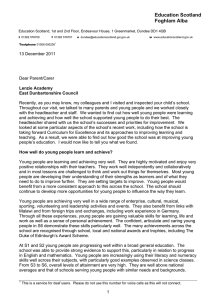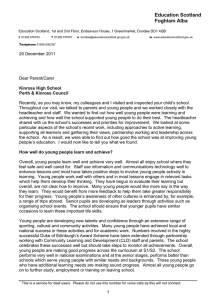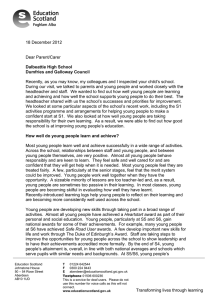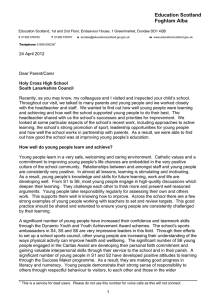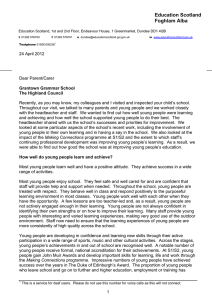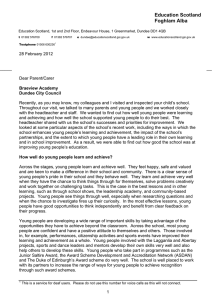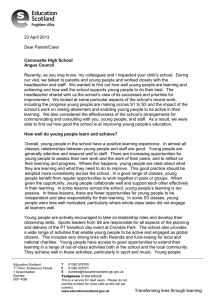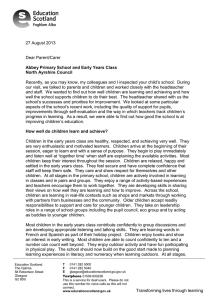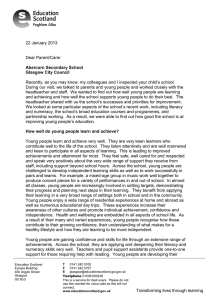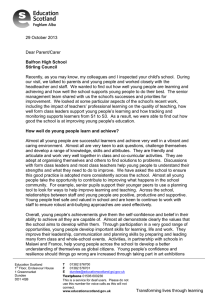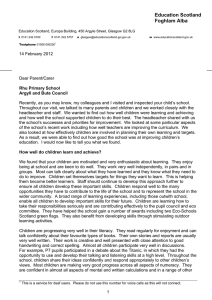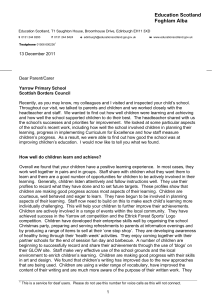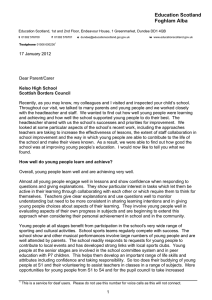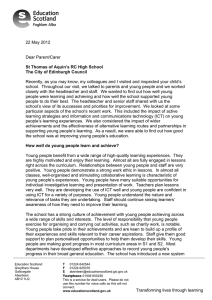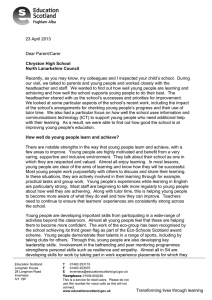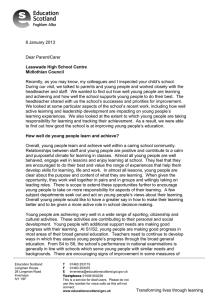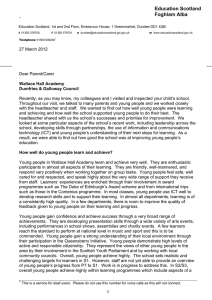Education Scotland Foghlam Alba
advertisement
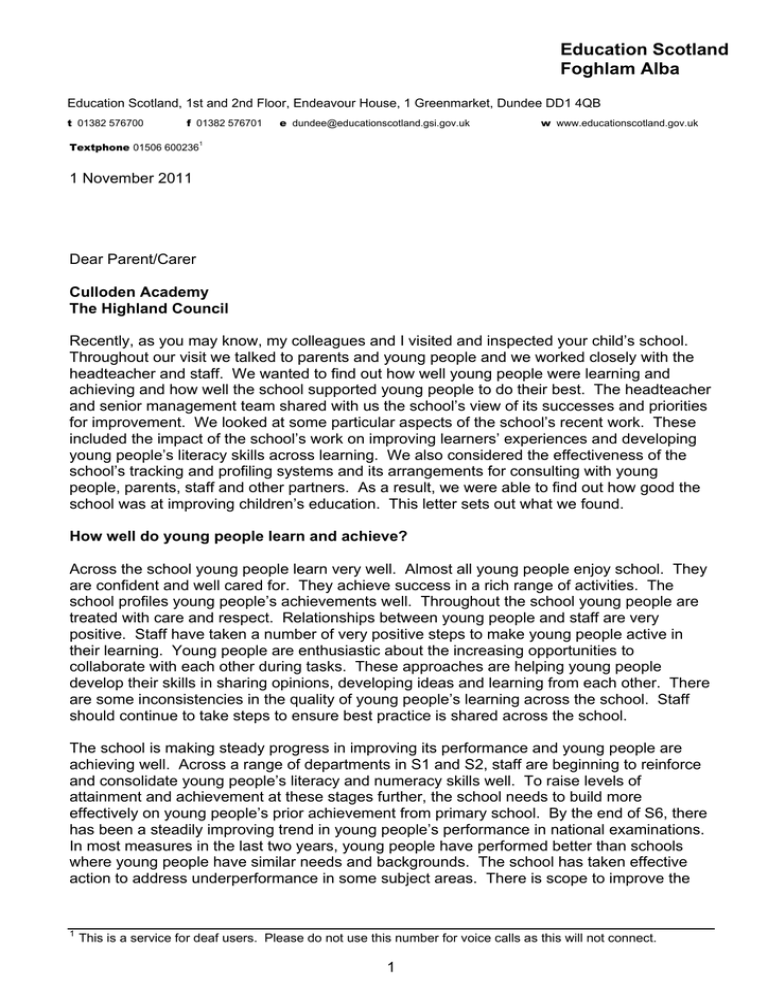
Education Scotland Foghlam Alba Education Scotland, 1st and 2nd Floor, Endeavour House, 1 Greenmarket, Dundee DD1 4QB t 01382 576700 f 01382 576701 Textphone 01506 600236 e dundee@educationscotland.gsi.gov.uk w www.educationscotland.gov.uk 1 1 November 2011 Dear Parent/Carer Culloden Academy The Highland Council Recently, as you may know, my colleagues and I visited and inspected your child’s school. Throughout our visit we talked to parents and young people and we worked closely with the headteacher and staff. We wanted to find out how well young people were learning and achieving and how well the school supported young people to do their best. The headteacher and senior management team shared with us the school’s view of its successes and priorities for improvement. We looked at some particular aspects of the school’s recent work. These included the impact of the school’s work on improving learners’ experiences and developing young people’s literacy skills across learning. We also considered the effectiveness of the school’s tracking and profiling systems and its arrangements for consulting with young people, parents, staff and other partners. As a result, we were able to find out how good the school was at improving children’s education. This letter sets out what we found. How well do young people learn and achieve? Across the school young people learn very well. Almost all young people enjoy school. They are confident and well cared for. They achieve success in a rich range of activities. The school profiles young people’s achievements well. Throughout the school young people are treated with care and respect. Relationships between young people and staff are very positive. Staff have taken a number of very positive steps to make young people active in their learning. Young people are enthusiastic about the increasing opportunities to collaborate with each other during tasks. These approaches are helping young people develop their skills in sharing opinions, developing ideas and learning from each other. There are some inconsistencies in the quality of young people’s learning across the school. Staff should continue to take steps to ensure best practice is shared across the school. The school is making steady progress in improving its performance and young people are achieving well. Across a range of departments in S1 and S2, staff are beginning to reinforce and consolidate young people’s literacy and numeracy skills well. To raise levels of attainment and achievement at these stages further, the school needs to build more effectively on young people’s prior achievement from primary school. By the end of S6, there has been a steadily improving trend in young people’s performance in national examinations. In most measures in the last two years, young people have performed better than schools where young people have similar needs and backgrounds. The school has taken effective action to address underperformance in some subject areas. There is scope to improve the 1 This is a service for deaf users. Please do not use this number for voice calls as this will not connect. 1 proportion of young people achieving Access, Foundation, General, Intermediate 1 and similar awards by the end of S4. How well does the school support young people to develop and learn? The school supports young people to learn well. Young people appreciate the broad choice of courses provided by the school at S3/S4. Almost all young people at S3 benefit from work experience. Young people have access to a wide range of courses at Higher and Advanced Higher level at S5/S6, including very good provision for languages. At S1/S2, all young people have an opportunity to learn Gaelic. Young people have a good range of opportunities to develop their skills through enterprising learning. Teachers are addressing aspects of health and wellbeing across the school well. While the school has taken some steps to develop the curriculum, particularly through drama, it is at the early stages of implementing Curriculum for Excellence. It has yet to develop a detailed plan for improving and developing the curriculum. It now needs to improve the curriculum further to help young people develop. In taking this work forward, the school needs to ensure it consults effectively with young people, parents and others in the community and continues to build links with employers and other partners. The school needs to take steps to ensure that young people at all stages, have appropriate opportunities for religious and moral education and for religious observance. At S5/S6, young people do not currently benefit from a clearly structured programme in personal and social education. Staff know young people well as individuals and are responsive to their needs. They support young people to develop and learn well. Teachers and support staff work together effectively to match tasks and learning activities to the needs of most learners. Guidance and support for learning staff are very knowledgeable about the young people they work with. They are fully committed to ensuring young people’s learning and pastoral needs are met effectively. Support for learning staff are skilled in planning and monitoring young people’s progress. The school works very well with a range of agencies to promote its inclusive approach to learning. There are particularly effective links with the children’s worker and the integrated services network. As a result of this high-quality work, the needs of young people who require additional support in their learning are very well met. How well does the school improve the quality of its work? The headteacher is well regarded and has the confidence of staff and parents. He has a high profile and knows the school well. Senior managers and staff are increasingly taking on leadership roles across the school. Staff have set up sharing good practice groups. These include groups on literacy, numeracy and health and wellbeing. This work is having a positive impact and is helping to raise confidence and improve consistency of approach across staff. The school has a well developed pupil profiling system. This is improving staff knowledge of learners and their progress at school. In S5 and S6, there are very effective arrangements for monitoring and tracking young people’s progress in their coursework. There is a robust and systematic approach for reviewing performance in national examinations at school and department level. However, there is clear scope to improve the school’s arrangements for leading and developing partnerships and managing the processes of change and improvement. The school has recently established a Parent Council. It is at an early stage of development and many parents would like to be consulted more. While the school has responded well to young people’s views in relation to some issues, they could be more involved in school improvement. The current improvement plan sets out a generally appropriate list of priorities for improvement. The school now needs to set out a clear plan of action, particularly for taking forward Curriculum for Excellence. Overall, there is scope for the school to improve its arrangements for involving its users in improving its work. The school should develop a stronger culture of improvement through self-evaluation based on 2 more systematic approaches to gathering the views of young people, parents, staff and the wider community. This inspection of your school found the following key strengths. • • • • The overall quality of young people’s experiences. Well-behaved and confident young people. Very positive relationships between staff and young people. Arrangements for providing support to young people requiring additional support in their learning. We discussed with staff and the education authority how they might continue to improve the school. This is what we agreed with them. • • Consult more widely with young people, parents, staff and other partners in taking forward improvements in the school and reporting on progress. Continue to take steps to improve the curriculum and learning and teaching, including the appropriate provision of religious and moral education. What happens at the end of the inspection? We are satisfied with the overall quality of education provided by the school. We are confident that, with greater consultation with young people, parents, staff and the wider community, the school has the capacity to improve further. As a result, we will make no further visits in connection with this inspection. The local authority will inform parents about the school’s progress as part of the authority’s arrangements for reporting to parents on the quality of its schools. Chris Webb HM Inspector 1 November 2011 Additional inspection evidence, such as details of the quality indicator evaluations, for your school can be found on the Education Scotland website at http://www.hmie.gov.uk/ViewEstablishment.aspx?id=8440&type=3. Please contact us if you want to know how to get the report in a different format, for example, in a translation. You can contact us at enquiries@educationscotland.gsi.gov.uk or write to us at BMCT, Education Scotland, Denholm House, Almondvale Business Park, Almondvale Way, Livingston EH54 6GA. If you want to give us feedback or make a complaint about our work, please contact 01506 600200, or write to us at the above address or e-mail: feedback@educationscotland.gsi.gov.uk 3
